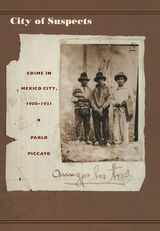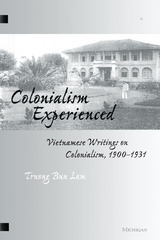2 books about 1900 - 1931

City of Suspects
Crime in Mexico City, 1900–1931
Pablo Piccato
Duke University Press, 2001
In City of Suspects Pablo Piccato explores the multiple dimensions of crime in early-twentieth-century Mexico City. Basing his research on previously untapped judicial sources, prisoners’ letters, criminological studies, quantitative data, newspapers, and political archives, Piccato examines the paradoxes of repressive policies toward crime, the impact of social rebellion on patterns of common crime, and the role of urban communities in dealing with transgression on the margins of the judical system.
By investigating postrevolutionary examples of corruption and organized crime, Piccato shines light on the historical foundations of a social problem that remains the main concern of Mexico City today. Emphasizing the social construction of crime and the way it was interpreted within the moral economy of the urban poor, he describes the capital city during the early twentieth century as a contested territory in which a growing population of urban poor had to negotiate the use of public spaces with more powerful citizens and the police. Probing official discourse on deviance, Piccato reveals how the nineteenth-century rise of positivist criminology—which asserted that criminals could be readily distinguished from the normal population based on psychological and physical traits—was used to lend scientific legitimacy to class stratifications and to criminalize working-class culture. Furthermore, he argues, the authorities’ emphasis on punishment, isolation, and stigmatization effectively created cadres of professional criminals, reshaping crime into a more dangerous problem for all inhabitants of the capital.
This unique investigation into crime in Mexico City will interest Latin Americanists, sociologists, and historians of twentieth-century Mexican history.
By investigating postrevolutionary examples of corruption and organized crime, Piccato shines light on the historical foundations of a social problem that remains the main concern of Mexico City today. Emphasizing the social construction of crime and the way it was interpreted within the moral economy of the urban poor, he describes the capital city during the early twentieth century as a contested territory in which a growing population of urban poor had to negotiate the use of public spaces with more powerful citizens and the police. Probing official discourse on deviance, Piccato reveals how the nineteenth-century rise of positivist criminology—which asserted that criminals could be readily distinguished from the normal population based on psychological and physical traits—was used to lend scientific legitimacy to class stratifications and to criminalize working-class culture. Furthermore, he argues, the authorities’ emphasis on punishment, isolation, and stigmatization effectively created cadres of professional criminals, reshaping crime into a more dangerous problem for all inhabitants of the capital.
This unique investigation into crime in Mexico City will interest Latin Americanists, sociologists, and historians of twentieth-century Mexican history.
[more]

Colonialism Experienced
Vietnamese Writings on Colonialism, 1900-1931
Truong Buu Lam
University of Michigan Press, 2000
The first three decades of the twentieth century in late-colonial Vietnam--the period that also marked the transition between the dominant Confucian and nascent Western worldviews--generated an abundance of political literature in that country. The documents from this transitional era belong to a variety of genres: propaganda pamphlets, open letters to government officials, texts for private or clandestine classrooms, manifestos of political or cultural organizations, columns from newspapers, public proclamations, petitions to international agencies, and poems. Whether from the old or the new era, however, they all expressed an opinion on the colonial status of their country.
Scholar Truong Buu Lam has collected twenty of these documents, all written between 1900 and 1931, into an anthology which captures the spirit of the conflicting ideologies and the political struggles of this time. Written originally in Vietnamese, French, or classical Chinese, the documents have been translated into English by Lam and given individual introductions in an effort to clarify their historical contexts most accurately. Lam also provides a lengthy overview of the contemporary scene at the time of the writings to further illuminate the grander themes tying the writings together.
In Vietnam, all of these writings are well-known texts, quoted in every publication that examines the period under consideration; yet, to the best of our knowledge, few have been reproduced in their entirety and none has ever been translated into English. This translation marks an important addition to the fields of Southeast Asian and colonial studies and will be welcomed by historians, political scientists, and anthropologists alike.
Truong Buu Lam is Associate Professor of History, University of Hawaii at Manoa. He is editor of the collections Patterns of Vietnamese Response to Foreign Intervention, 1858-1900 and Borrowings and Adaptations in Vietnamese Culture, and the author of Resistance, Rebellion, Revolution: Popular Movements in Vietnamese History and New Lamps for Old: The Transformation of the Vietnamese Administrative Elite.
Scholar Truong Buu Lam has collected twenty of these documents, all written between 1900 and 1931, into an anthology which captures the spirit of the conflicting ideologies and the political struggles of this time. Written originally in Vietnamese, French, or classical Chinese, the documents have been translated into English by Lam and given individual introductions in an effort to clarify their historical contexts most accurately. Lam also provides a lengthy overview of the contemporary scene at the time of the writings to further illuminate the grander themes tying the writings together.
In Vietnam, all of these writings are well-known texts, quoted in every publication that examines the period under consideration; yet, to the best of our knowledge, few have been reproduced in their entirety and none has ever been translated into English. This translation marks an important addition to the fields of Southeast Asian and colonial studies and will be welcomed by historians, political scientists, and anthropologists alike.
Truong Buu Lam is Associate Professor of History, University of Hawaii at Manoa. He is editor of the collections Patterns of Vietnamese Response to Foreign Intervention, 1858-1900 and Borrowings and Adaptations in Vietnamese Culture, and the author of Resistance, Rebellion, Revolution: Popular Movements in Vietnamese History and New Lamps for Old: The Transformation of the Vietnamese Administrative Elite.
[more]
READERS
Browse our collection.
PUBLISHERS
See BiblioVault's publisher services.
STUDENT SERVICES
Files for college accessibility offices.
UChicago Accessibility Resources
home | accessibility | search | about | contact us
BiblioVault ® 2001 - 2024
The University of Chicago Press









